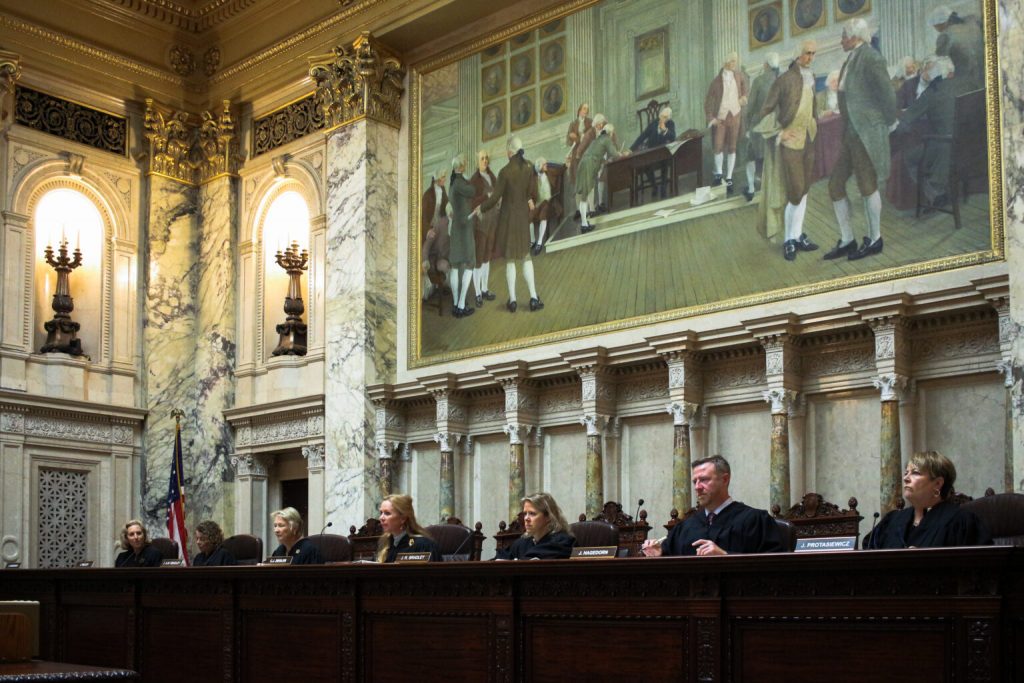Wisconsin Supreme Court Hears Arguments in Two Election Cases
Regarding a conspiracy group's request for records and Racine's mobile voting units.

The seven members of the Wisconsin Supreme Court hear oral arguments. (Henry Redman | Wisconsin Examiner)
The Wisconsin Supreme Court heard oral arguments Tuesday in two election-related cases, showing the continued wrangling over access to the ballot with less than two months to go until the presidential election in November.
The first case involves a right-wing election conspiracy group, Wisconsin Voter Alliance, which has spent years casting doubt on the results of the 2020 election by alleging fraud in the state’s election system. The group, founded by conspiracy theorist Ron Heuer, has been filing records requests with counties across the state seeking documents showing the identities of people in Wisconsin who have been declared incompetent by a judge and had their right to vote taken away.
This case has been closely watched as a symbol of the increasing partisanship in Wisconsin’s lower courts because the District 2 Court of Appeals, which covers most of the suburban counties outside of Milwaukee and is controlled by a conservative majority, ignored a previous decision by the liberal majority on the Madison-area District 4 Court of Appeals in a similar case over the exact same records.
The Wisconsin Voter Alliance has asked for the names and addresses of people who have been declared incompetent in guardianship cases so the group can compare that list with the voter rolls in the statewide voter registration database and find any people who have been voting despite having the right to do so taken away. County officials across the state have been denying these requests because state law requires that any court records in these cases “pertinent” to the declaration of incompetency be kept secret.
In the District 4 case, Juneau County denied access to the records and the Court of Appeals agreed with that denial but in the subsequent District 2 case, Walworth County denied access to the records and the Court of Appeals reversed that decision, despite a 1997 precedent that state courts of appeal in Wisconsin can’t overrule each other.
Represented by Erick Kaardal, a right-wing attorney who was deeply involved in the widely derided review of the 2020 election by former Supreme Court Justice Michael Gableman — which focused heavily on the issue of declarations of incompetency — WVA argued in the oral arguments Tuesday that judges should consider the importance of the documents when weighing if a records request should be denied.
Kaardal went back and forth repeatedly with justices over access to a specific form used by courts in these cases that list the names and addresses of people declared incompetent is not pertinent to the incompetency declaration.
“If there were a document drafted to meet the statute requirement and be publicly disclosed, this is the one,” Kaardal said. “This is a great document because it doesn’t refer to the reasons the person was found to be incompetent. It doesn’t, it just says ‘can’t vote.’”
But Justice Jill Karofsky repeatedly asked him to explain why that document isn’t pertinent to the finding of incompetency.
“Why is that not pertinent to the finding and competency?” she asked.
Kaardal responded by saying judges had to assess the interpretation of state law within the specific facts and context of the case, a response that appeared to annoy Karofsky who said she’s “done this for a few years” and understands “that I apply the law to the facts of the case. I don’t need you to tell me that.”
The response was similar to one Kaardal had previously provided to Justice Brian Hagedorn, arguing that because the Dane County Clerk had done a review of these individuals and found a number of people who had cast ballots despite having their right to vote taken away, that review shows there’s a genuine interest in obtaining the records.
Hagedorn said he has a lot of experience with public records lawsuits from his work prior to joining the court and that judges in those cases aren’t supposed to consider the context or how well-meaning the intentions of the requester are — only if the law demands the documents’ disclosure or prevents their release.
“It doesn’t matter, right?” Hagedorn said. “I mean, you know people who make public records requests, they can have wonderful motives. They can have terrible motives. They can have everything in between, but the law doesn’t really care, for the most part, what their motives are.”
Samuel Hall, the attorney representing Walworth County, argued the law requires that these records be kept confidential.
“Now the purpose behind the request and who the requesters are, as noble as they may be, are irrelevant under Wisconsin public records law,” Hall said. “The truth of the matter is that the District 2 Court of Appeals decision blasts open the door for the personal information of some of the most vulnerable people in our communities to be broadcast, not only to those with noble and good intentions, but to those who might do these folks harm or seek to defraud them.”
He added that to the extent that there is an interest in conducting oversight of this government function — in which the court system is required to make local election clerks aware of decisions so the clerks can update voting records — there are plenty of avenues to do so without a private citizen or organization getting access to information state law deems confidential.
“To the extent that there’s a desire to have oversight or a watchdog, per se, it doesn’t need to be done by a private individual or a private organization. Voting when ineligible to do so is a class I felony,” Hall said. “If there is a concern that that is going on, reporting it to law enforcement, reporting it to a local sheriff, could lead to a criminal investigation. We have a legislative process where even, you know, the Assembly or Senate could conduct inquiries, or the Wisconsin Elections Commission itself could conduct inquiries. None of that has happened here. This is a private organization seeking personal information of court documents that the Legislature has already deemed closed.”
Racine mobile absentee sites
The second case on the docket Tuesday was a lawsuit from a private citizen over the City of Racine’s use of “mobile voting units” to conduct early in-person absentee voting. The units, about the size of an RV, allowed the city to hold early voting at sites across the city where voters could request, cast and return absentee ballots.
The lawsuit, brought by Kenneth Brown, represented by the conservative Wisconsin Institute for Law & Liberty (WILL), argues that state law requires early in-person sites outside of clerks’ offices in city hall to be actual buildings and placed in a manner that does not provide a partisan advantage to one political party.
Brown brought a challenge to the Wisconsin Elections Commission (WEC) arguing the mobile voting units weren’t allowed. The commission dismissed the complaint, a decision that Brown appealed to the circuit court. The circuit court judge agreed with Brown, disallowing the use of the units and the case was appealed to the Supreme Court.
Defending the use of the vans were four groups, the Department of Justice representing WEC, the City of Racine, activist group Black Leaders Organizing for Communities and the Democratic National Committee.
DOJ attorney Gabe Johnson-Karp argued that Brown did not even have standing to bring the case, that the law requires an “injury of fact” to have the grounds to bring a lawsuit. Brown, Johnson-Karp said, who witnessed the use of the mobile voting units but was not disenfranchised by them, is not in a position to bring a suit. The election statutes, he said, require a voter to be “aggrieved” to appeal the WEC decision and Brown hasn’t been.
Justice Janet Protasiewicz pushed back on the argument asking who does have legal standing to challenge a decision such as this one by a local election clerk in court.
“Somebody must have standing to bring the action,” she said. “Hypothetically speaking, the mobile units are illegal, invalid or unconstitutional. Shouldn’t somebody be able to bring the action?”
During WILL attorney Lucas Vebber’s arguments, the justices focused heavily on the question of standing. Vebber’s argument is that Brown, or anyone, is “aggrieved” when the WEC denies the complaint. The act of losing at the commission level gives the standing to challenge that decision.
But several of the justices were confused by that argument, questioning if there would be a limit. Anyone can file a complaint with the elections commission based on their belief that the law was broken, but that belief can be completely bogus and not necessarily make for a valid legal claim.
“There’s no guardrails at all on what you’re proposing,” Justice Rebecca Dallet said.
Scott Letteney, the Racine City Attorney, argued that the city had the statutory ability to use the mobile voting units. He said that the statute requiring voting to take place in physical structures only applies to polling places on Election Day and local clerks under Wisconsin law are given broad discretion to run elections as they see fit within the outlines of the law.
“The clerk has broad discretion,” Letteney said. “She’s one of — I think it’s called a small army of local election officials that has to conduct elections in the state.”
Charles Curtis, an attorney for the DNC, argued that the claims that the mobile voting sites were selected to advantage one party over another are untrue. He disputed an analysis done by Brown of the voting behaviors of the election wards in which the sites were placed and added that WEC and the courts should defer to local election officials to know their communities.
“If the city comes forward with evidence that it has attempted using neutral criteria to serve as many people as possible … then I think first of all, a reviewing court needs to give some deference to the local government priorities,” he said. “Local governments know their communities better than circuit judges or WEC or certainly this court, and so they deserve some deference.”
Justice Rebecca Bradley questioned how the Democratic Party could be defending the use of the voting units if there wasn’t a partisan advantage at play. Curtis responded that the Democratic Party was interested in protecting voting rights at large.
During Vebber’s arguments, he said that state law requires the sites to be in wards that have the same electoral makeup as the ward in which city hall sits, or just placed in the same ward.
“It was the Legislature’s concern that an in-person absentee ballot site located outside of the municipal clerk’s office would afford or would be used to play games placed in a location that made it easy for members of one political party to vote or members of other political parties more difficult to vote,” Vebber said. “That’s the obvious concern, and why it was added into the statute, just from the plain language of the statute itself. But the only way then to resolve that concern, or to give that concern any meaning, and that text in the statute is to look at the partisan makeup, the political makeup of the site where the in-person absentee voting site would be located and the only way to do that at the local level is to look at ward data.”
Protasiewicz questioned this application to the election in which Brown challenged the use of the mobile voting units because it was a partisan primary so the two major parties weren’t competing against each other. Karofsky questioned its effect on early voting in general.
Karofsky noted that Milwaukee has 354 voting wards and if the only ward that can hold in-person early voting is the ward in which the Milwaukee Elections Commission offices are located, that defeats the point of having early voting to make it more accessible.
Dallet added that voters are not tied to early voting sites the same way as they are polling places on Election Day. People can vote early in person at a site located along their commute to work, or near their kid’s school, or across the street from their office, so the voting behavior of the ward in which the site is located isn’t even relevant.
“You’ve made an assumption that somehow it benefits the political party of the people that make up the ward in the most numbers by putting an alternate site there,” she said. “But isn’t it true that people work in other wards? They run errands in other wards? They pass a ward on the way to work? Democrats and Republicans. And so how can you just make this presumption that having another site in their ward is somehow going to benefit anybody? It could hurt Republicans. It could hurt Democrats. It doesn’t make sense to me what you’re saying that you have to all lump them into the one ward where the clerk’s office is. That doesn’t seem to correlate in any meaningful way with giving access based on some kind analysis of whether a political party is advantaged or disadvantaged. I just don’t understand that connection.”
Wisconsin Supreme Court hears arguments in two election cases was originally published by Wisconsin Examiner.





















